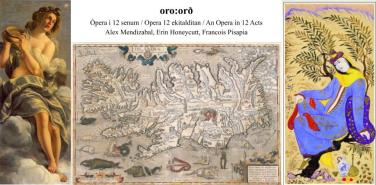
The presentation of the opera will consist of a conversation about the process of creation of the opera between Alex Mendizabal and Oier Etxeberria (20min), and then the opera will be projected (1h). The session will be conducted entirely in Basque.
Oro:orð is simplified communication forms within a libretto, music, water, bubbles and images in twelve acts. It may take different forms such as (but not only) installation, radio play, internet or operatic stream, underwater publications.
Oro:orð is inspired by the Icelandic Basque Pidgin, a trading language used between Basque and Icelandic whalers in the late 16th and early 17th century. It was not spoken, but only written on ledgers. Like the internet itself, it is a communication device for economic purposes, which is, in fact, an artifact.
The opera, sung and recited in euskara and icelandic, is written in english and is composed of ‘acts’ based on paintings produced in the year 1616 from around the world, reflecting on the long arrival of the current state of globalization.
Co-produced with the Icelandic project FLURRR.
Text and images: Erin Honeycutt
Camara and edition: François Pisapia
Music and foam: Alex Mendizabal
Characters:
A Pigeon photographer
Jahangir (“Seizer of the World”), the fourth Emperor of the Mughal dynasty
Daniel, of Bible notoriety
Don Felipe Guaman Poma de Ayala, an indigenous Andean man
Three of the seven gods of good fortune - Daikoku, Ebisu, and Hotei
Europa
Johannes Trithemius, author of De Septem Secundeis
Artemisia Gentileschi
Woman Seated in a Tree
72 people will be able to attend the concference and projeection of the Opera in Tabakalera. Invitations can be requested through pgaraikideak@tabakalera.eu
Oro:orð is simplified communication forms within a libretto, music, water, bubbles and images in twelve acts. It may take different forms such as (but not only) installation, radio play, internet or operatic stream, underwater publications.
